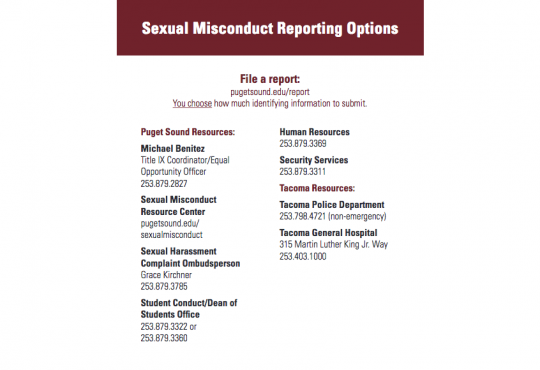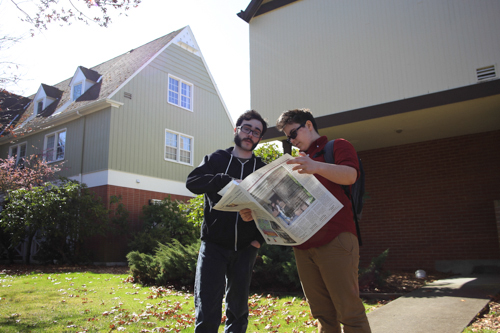
At most institutions of higher education, a single day does not pass without a report of a bias- or hate-related crime. With the excess of programs promoting diversity and a seemingly authentic culture of acceptance on campus, it would be easy to be lulled into the mindset that “things like that” don’t happen here—not like they do at other schools. Unfortunately, Puget Sound does not prove an exception.
While almost every semester there is the occasional campus-wide email informing us that an incident of hate, bias or other assault occurred (you may remember the case this semester, in which an individual was pushed to the ground and called a derogatory term in reference to homosexuality), it would be naïve to think that these are the only incidences.
This issue has sparked a conversation on campus relating to why only a small percentage of such incidents are made public. Several students have turned to the Puget Sound Bias-Hate Education Response Team for answers.
In the fall of 2005, the Faculty Diversity Committee formed a subcommittee to address the issue of responding to incidents of bias-hate on our campus, following the creation and implementation of the University’s diversity strategic plan. The official purpose of BHERT is to assist in addressing issues of bias and hate at Puget Sound, not only prompting greater awareness but also analyzing how they shape our community.
While there are formal channels to address complaints, BHERT is intended to create a new structure for “proactive dialogue related to emerging trends of bias or hate incidents,” allowing for the “burden of responding to such incidents to be lifted from the shoulders of the target group’s members,” according to BHERT’s webpage.
Current members of the subcommittee include a variety of faculty, staff and students, such as the Chief Diversity Officer, the Director of Multicultural Student Services and the Director of Resident Life.
BHERT’s objectives include upholding the institutional mission and commitment to multicultural values and social justice; monitoring incidents of bias and hate affecting the Puget Sound community; consulting, supporting and providing resources toward resolving incidents of bias and hate for individual(s) and/or groups impacted; and serving as one tool to maintain institutional accountability in creating an inclusive living and learning environment at Puget Sound.
Reports go directly to the BHERT chair (MCSS Director/Chief Diversity Officer), and then provide data regarding the particulars of the incident, including what campus support has been utilized and if resolution has occurred. Reviewing aggregate data gathered from such cases allows the committee to support and influence future educational opportunities and increase awareness.
Chief Diversity Officer and committee chair Czarina Ramsay references the trend of gender-related reports of bias from last semester as an example. The cases have been shared with a Sexual Assault Working Group, now tasked with assessing current institutional programs and resources to help assault prevention.
“Understanding the types of bias incidents reported that are gender related, frequency, areas of campus providing reports that BHERT has collected will help this working group deconstruct the issues of gender and assault present on campus,” Ramsay said.
Those involved with sexual assault prevention on campus are very interested in seeing BHERT’s findings published in a forum such as The Trail. I spoke with one student (who has chosen to remain anonymous) who emphasized the importance of awareness and publicity in order to change the culture of sexual assault on any campus.
The student went on to commend BHERT for its efforts, and appreciates that the committee recognizes the need for an easier system of reporting: “I understand that they are discussing ways to publicize their findings in a better way, and I am in full support of this progress … BHERT could be influential in normalizing discussion about issues of this nature afflicting our campus.”
In their involvement with sexual assault prevention, it is apparent that students are not aware that sexual assault happens at such a frequent rate, and thinks it likely that this is the case with other forms of harassment or hateful actions.
Former senate member Sadie Boyers is an ardent supporter of reporting the findings of BHERT in a more public forum. She has met with the committee to discuss the possibility of publishing their crime reports in The Trail’s security report section. “I think BHERT’s findings should be made public because students deserve to know exactly what is happening on campus … Students can’t protect themselves from events that they are unaware of,” Boyers said.
She believes that publishing the information in The Trail’s security report section at the end of each semester could be effective, and that it would be prudent to facilitate a discussion revolving around the report if it is indeed published. As to the effectiveness of the committee, she would like to see the committee facilitate a larger campus wide discussion regarding their findings as they work to create an education space for “reflection and dialogue.”
Ramsay agrees that BHERT’s effort in fulfilling its objectives is an ongoing endeavor. She shares Boyers’ sentiment that making this information more available would be beneficial, and that recognizing that biased behavior and hatred still exist is a “critical component of multicultural advocacy and education.”
Ramsay fully believes that campus is no exception to the reality of existent stereotypes and prejudices, and that publishing the information collected by BHERT along with a dialogue is a step in the right direction. She lists not only The Trail, but the annual Diversity & Inclusion Report, various committee meetings including ASUPS Senate and SDC Governing Council and Logger Diversity Summits as strong initial steps for making this information heard to the larger campus community.
There has been speculation as to whether the administration has hesitated to publish information of this nature in an effort to preserve the school’s image. However, I would be disinclined to believe the conspiracy theorists on this particular issue, and hope that in the near future we see a section in this publication dedicated to increasing awareness of hate crimes and harassment among the campus community.
Report incidents of bias or hate on campus to any committee member or at BERT@pugetsound.edu.





